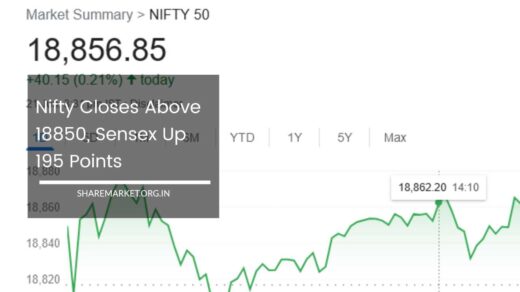DMart Share Price Up: Brokerage Bullish, Raises Target Price (Twice in a Week!)

DMart Share Price
DMart: A Deep Dive into the Indian Retail Giant’s Bullish Prospects
Avenue Supermarts, the powerhouse behind the ubiquitous DMart retail chain, is captivating the attention of brokerage firms and investors alike.
Despite a minor dip in its share price on April 2nd, the overall sentiment leans heavily towards optimism, fueled by DMart’s robust fundamentals and ambitious growth initiatives.
This analysis dives beneath the surface, exploring the factors driving this bullish outlook, along with DMart’s recent performance and the target prices set by prominent brokerages.
A Retail Titan with a Legacy of Strength
Avenue Supermarts stands tall in the Indian retail landscape, boasting a market capitalization of Rs 2,87,448 crore. This impressive figure reflects the company’s established presence and strong financial standing.
The 52-week high of Rs 4,590 underscores investor confidence in the company’s potential, while the low of Rs 3,353.05 highlights the stock’s relative stability.
At the forefront of this success story lies Radhakishan Damani, a visionary leader and a well-respected figure in the Indian investment world. His experience and strategic direction have been instrumental in shaping DMart’s journey.
CLSA’s Upward Revision: A Resounding Endorsement
Leading brokerage firm CLSA has issued a resounding “Buy” rating for Avenue Supermarts, signifying their belief in the company’s long-term potential. This positive outlook is further bolstered by their recent revision of the target price upwards, from Rs 5,307 to Rs 5,514.
This 25% increase translates to a significant vote of confidence in DMart’s growth trajectory. Their decision to initiate coverage with a Buy rating and subsequently revise the target price twice within a week underscores their strong conviction in the company’s prospects.
Impressive Growth Spurt Fuels Investor Optimism
Since CLSA’s initial coverage, Avenue Supermarts’ stock has witnessed a significant jump of over 7%. This surge reflects the positive sentiment resonating amongst investors who are buoyed by the company’s impressive performance.
Furthermore, the stock has gained a remarkable 20% in the past six months, coinciding with the company achieving its highest ever quarterly store expansion.
DMart added an exceptional 21 stores in the March quarter alone, bringing its total store count to a robust 365 as of March 31st.
This accelerated pace of store additions is a key factor that resonates with CLSA. They believe it will not only alleviate investor concerns but also pave the way for improvements in product mix and gross margin.
These enhancements have the potential to further strengthen the company’s financial performance and position it for even greater success.
Additionally, CLSA emphasizes the significance of quarterly sales figures, which act as a barometer for investor scrutiny. This underlines the market’s keen interest in Avenue Supermarts’ ongoing performance and its ability to deliver consistent growth.
Stellar Performance Across Timeframes: A Reward for Long-Term Vision
Looking at historical performance, Avenue Supermarts shares have delivered exceptional returns across various timeframes.
Over the past month, the stock has surged by 15%, showcasing robust investor confidence. The last six months have yielded a commendable 19%, highlighting the company’s resilience and growth potential.
Year-to-date, the appreciation stands at a healthy 9%, further bolstering investor sentiment. For those invested over the past year, the return is a noteworthy 25%. However, the most impressive gains are reserved for long-term investors.
Those who have held DMart shares for the past four years have witnessed a phenomenal 130% return on their investment, a testament to the company’s consistent growth trajectory and its ability to reward long-term vision.
Beyond the Numbers: A Nuanced Look at the Road Ahead
While the analysis paints a compelling picture, it’s important to acknowledge that the road ahead may not be entirely smooth.
The Indian retail sector is fiercely competitive, with established players like Big Bazaar and Reliance Retail, along with emerging online competitors like Amazon and Flipkart, all vying for market share.
Macroeconomic factors such as inflation and interest rate fluctuations can also impact consumer spending patterns. Investors should consider these potential challenges alongside the positive indicators before making investment decisions.
Further Exploration: Unveiling the Layers of DMart’s Success
For a more comprehensive understanding, consider researching the following aspects:
- DMart’s Competitive Landscape: A deeper dive into how DMart plans to maintain its market share in the face of stiff competition from established players and new-age online retailers.
- The Omnichannel Strategy: Explore DMart’s online presence and its plans to integrate its physical stores with its online platform to create a seamless shopping experience for customers.
- Navigating the Regulatory Landscape: Analyze the impact of recent regulations and policy changes on the retail sector, such as foreign direct investment (FDI) norms and e-commerce regulations, and how DMart plans to adapt and thrive within this evolving environment.
- Future Expansion Plans and Innovation: Investigate DMart’s future expansion plans, including potential new store formats such as smaller convenience stores in urban areas or larger wholesale outlets. Additionally, explore any potential for geographical expansion beyond India’s borders.
By delving deeper into these areas, investors can gain a more nuanced perspective on DMart’s prospects and make informed investment decisions.
DMart’s Competitive Edge: A Recipe for Success
DMart has carved a niche for itself in the Indian retail landscape through its distinct business model. Let’s explore some key ingredients in this recipe for success:
- Everyday Low Cost (EDLC) Pricing: DMart prioritizes offering everyday products at consistently low prices, often below the MRP (Maximum Retail Price). This strategy resonates with budget-conscious Indian consumers and fosters customer loyalty.
- Efficient Supply Chain Management: DMart operates on a lean model, minimizing operational costs through efficient sourcing, bulk buying, and streamlined logistics. This allows them to maintain low prices without compromising on quality.
- Focus on Private Labels: DMart offers a curated selection of private label brands alongside national brands. These private labels provide good quality at even lower prices, further enhancing value for customers and boosting the company’s profit margins.
- Limited Frills, High Efficiency: DMart stores are strategically located in non-premium locations, focusing on functionality rather than aesthetics. This helps them reduce rental costs and pass on the savings to consumers. Additionally, DMart maintains a lean staffing model, optimizing labor costs.
The Evolving Retail Landscape: DMart’s Omnichannel Strategy
While DMart has built its empire on the strength of its brick-and-mortar stores, the retail landscape is undergoing a significant shift towards online shopping.
Recognizing this trend, DMart has taken initial steps towards establishing an online presence. However, their online strategy remains in its nascent stages. Here are some key questions to consider:
- Will DMart launch a full-fledged e-commerce platform or partner with existing online marketplaces?
- How will DMart integrate its online platform with its physical stores to create a seamless omnichannel experience for customers (e.g., click-and-collect options)?
- Can DMart effectively compete with established online retailers who have a head start and significant resources?
These are crucial questions that will determine DMart’s success in the evolving retail ecosystem. Investors should closely monitor developments in DMart’s omnichannel strategy to assess its potential impact on the company’s future performance.
Final Thoughts: A Well-Positioned Player with Room for Growth
DMart’s strong fundamentals, impressive growth trajectory, and commitment to its core values make it a well-positioned player in the Indian retail sector.
The bullish sentiment from leading brokerages like CLSA further underscores the company’s potential. However, navigating the competitive landscape, adapting to a changing regulatory environment, and effectively implementing an omnichannel strategy will be key to DMart’s continued success.
By closely monitoring these factors and DMart’s strategic responses, investors can make informed decisions about their participation in this promising retail giant.

















